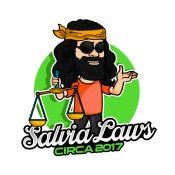Is salvia divinorum legal in Texas?
NO – Illegal
Salvia divinorum is not legal to possess, transport, and/or sell in Texas.
Salvia was made illegal in 2013.
Sponsored: Order America’s #1 salvia divinorum for sale online at Salvia Hut!
What Is Salvia Divinorum?
Salvia Divinorum is a psychoactive plant native to the Sierra Mazateca region of Mexico. It is a member of the sage family (Lamiaceae) and is known for its potent hallucinogenic properties. Salvia Divinorum contains a psychoactive compound called salvinorin A, which is unique to this plant. When consumed, typically by chewing the leaves or smoking extracts, it can induce intense, short-lived hallucinatory experiences. This plant has a long history of use in traditional shamanic rituals among indigenous people in Mexico for its perceived ability to facilitate spiritual journeys and visions. While not considered addictive, its psychoactive effects have led to its regulation and control in various jurisdictions.
What Is Salvia Divinorum Also Known As?
- Diviner’s Sage
- Sage of the Diviners
- Magic Mint
- Maria Pastora
- Shepherdess’s Herb
- Lady Salvia
- Seer’s Sage
- Purple Sticky
How Is Salvia Divinorum Used?
Salvia Divinorum is typically used by either chewing its fresh leaves or smoking extracts derived from the plant. Chewing the leaves produces a milder, longer-lasting effect, while smoking extracts results in more immediate and intense experiences.
What Are The Effects Of Salvia Divinorum?
The effects of Salvia Divinorum typically include intense, short-lived hallucinatory experiences. These effects may manifest as altered perception, vivid visions, and distortions of reality. The intensity and nature of the experiences can vary among individuals.
What Is The History Of Salvia Divinorum?
Salvia Divinorum has a rich history that traces back to its traditional use by the Mazatec indigenous people of Mexico in spiritual rituals and healing practices. While the plant’s documented history in Western academia began with botanists Carl Epling and Carlos D. Játiva, who were the first to document it, it was researcher Jean Basset Johnson who is credited with introducing it to the Western world in the 1960s. This unique plant continues to captivate interest due to its mystical and hallucinogenic properties.
Hello! My name is John Marston. I discovered the enchanting world of salvia divinorum back in 2009 and have been captivated by its magic ever since. Over the years, I’ve written extensively on this topic, crafting hundreds of articles for various websites, news outlets, and newsletters. My goal is to share my passion for salvia and spread awareness by providing valuable legal information through my website, SalviaLaws.Com.
